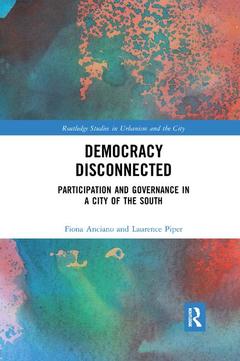Description
Democracy Disconnected
Participation and Governance in a City of the South
Routledge Studies in Urbanism and the City Series
Authors: Anciano Fiona, Piper Laurence
Language: English
Subjects for Democracy Disconnected:
Keywords
Imizamo Yethu; south african governance; Hout Bay; south african democracy; Developmental Governance; south african cities; BRT System; participatory governance; Helen Zille; participatory democracy; Ward Councillor; participation and governance; ANC Official; governance of cities; Civil Society; urban geography; Market Governance; democractic governance; Urban Poor; urban governance; Bus Rapid Transport System; disconnected democracy; Ward Committees; cities of the global south; Urban South; citizenship and governace; Equal Belonging; Laurence Piper; Cape Town; Informal Settlement; Chapman’s Peak; Formal South; SSF; Western Cape Provincial Government; Toll Plaza; ANC Leader; Gated Communities; Taxi Owners; Small Scale Fishing Communities
Approximative price 50.12 €
In Print (Delivery period: 14 days).
Add to cartPublication date: 05-2019
· 15.6x23.4 cm · Paperback
Approximative price 160.25 €
In Print (Delivery period: 14 days).
Add to cartPublication date: 10-2018
· 15.6x23.4 cm · Hardback
Description
/li>Contents
/li>Readership
/li>Biography
/li>
Why is dissatisfaction with local democracy endemic, despite the spread of new participatory institutions? This book argues that a key reason is the limited power of elected local officials, especially to produce the City. City Hall lacks control over key aspects of city decision-making, especially under conditions of economic globalisation and rapid urbanisation in the urban South.
Demonstrated through case studies of daily politics in Hout Bay, Democracy Disconnected shows how Cape Town residents engage local rule. In the absence of democratic control, urban rule in the Global South becomes a complex and contingent framework of multiple and multilevel forms of urban governance (FUG) that involve City Hall, but are not directed by it. Bureaucratic governance coexists alongside market, developmental and informal forms of governance. This disconnect of democracy from urban governance segregates people spatially, socially, but also politically. Thus, while the residents of Hout Bay may live next to each other, they do not live with each other.
This book will be a valuable resource for students on programmes such as urban studies, political science, sociology, development studies, and political geography.
Introduction: The paradox of more participation and less satisfaction with democracy 1. The Republic of Hout Bay: A house divided 2. A River of Grime: governing water and waste 3. Selling the Mountain: property, housing and neo-apartheid segregation 4. Defending the shack: the politics of developmental governance 5. Poaching the bay: turning fisherfolk into smugglers 6. Upgrading Imizamo Yethu: contests of governance and belonging 7. Taxis, Violence and Leadership in Imizamo Yethu 8. Protesting Chapman’s Peak Toll Road: Market governance versus environmental politics 9. Guarding the bay: securing safety beyond the police Conclusion: democracy, governance, and neo- apartheid
Fiona Anciano is a Senior Lecturer in the Department of Political Studies at the University of the Western Cape, South Africa. Her research areas include civil society, democracy, and urban politics.
Laurence Piper is Professor of Political Studies at the University of the Western Cape, South Africa and visiting Professor at the University West, Sweden. His research area is urban politics in the Global South.

